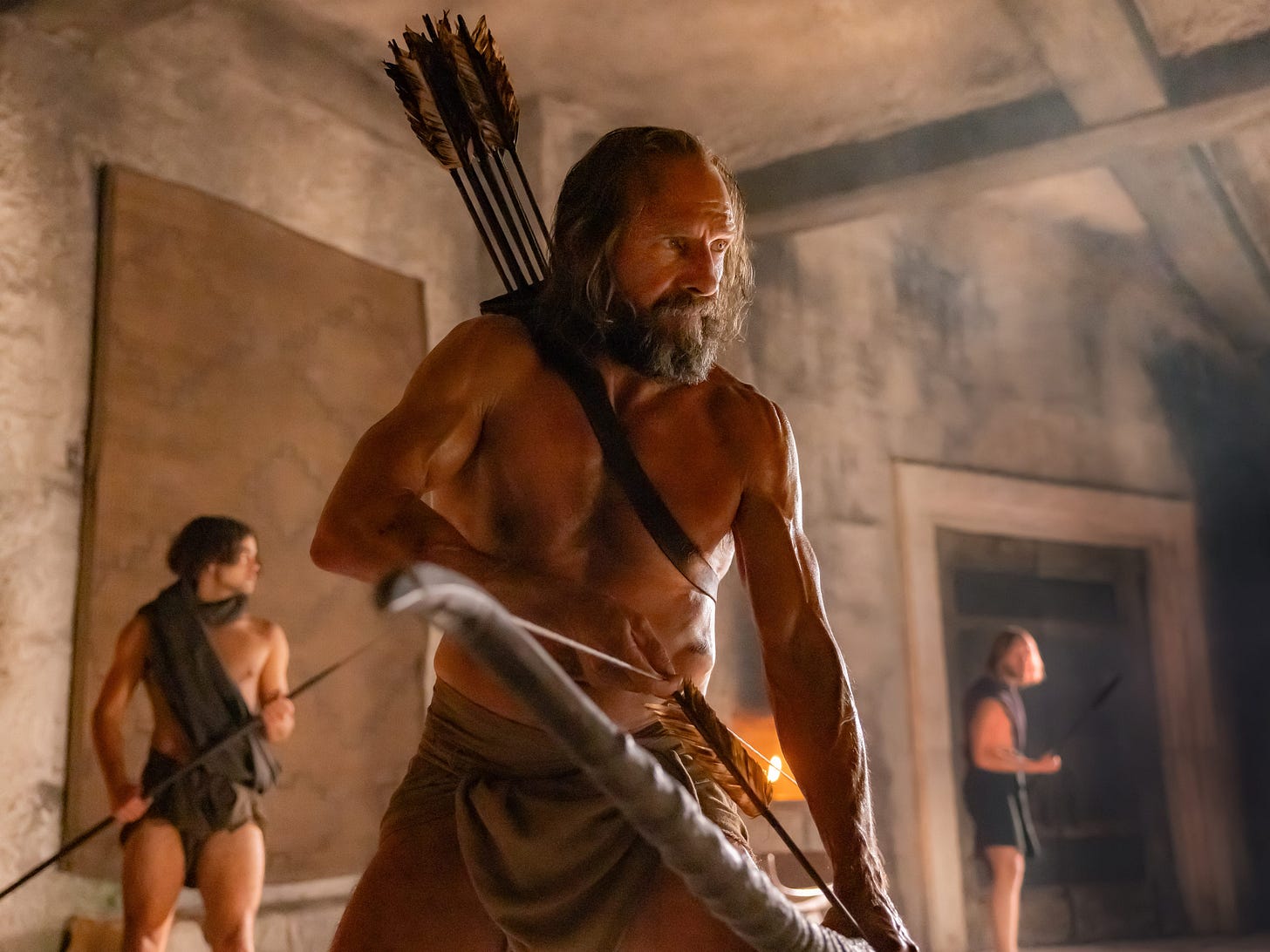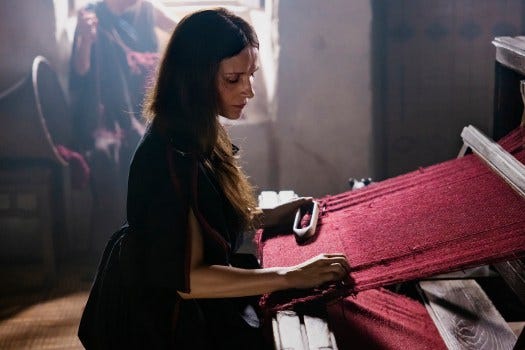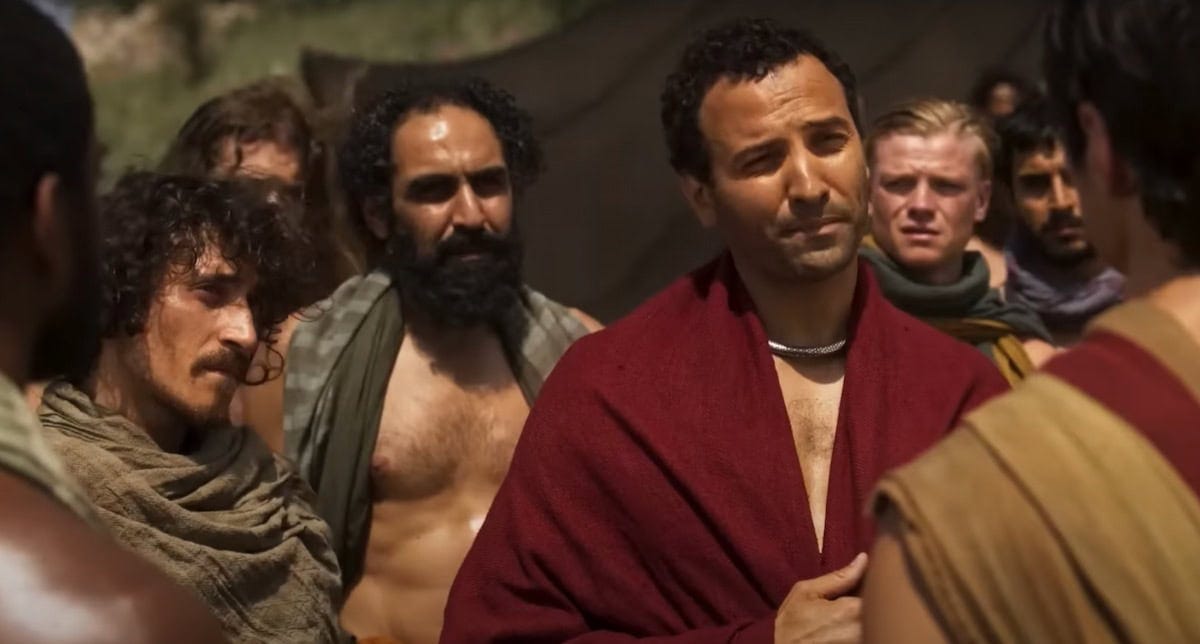In one of the more entertainingly insane moments from 2009’s Call of Duty: Modern Warfare 2, series protagonist Captain Price hijacks and detonates a nuke over the United States’ Atlantic coastline. Our nation’s capital, you see, has just been invaded by the Russians, and Price’s rationale is that when a bomb goes off, the easiest way to contain its effects is to set off an even larger bomb right next to it, siphoning its oxygen away and rendering the original blast radius inert. His plan works by destroying all of the Russians’ electronic equipment and leaving them sitting ducks. It also destroys the International Space Station, but that’s beside the point. He got to solve a problem with a bomb and that’s all that matters.
Similarly, pretty much all news of The Return, a modest but artfully positioned adaptation of the second-half of The Odyssey, was robbed of its oxygen the moment Christopher Nolan announced that his next film would be a full-scale adaptation of Homer’s epic.* The Return’s distributor, the indie label Bleecker Street, didn’t make much of an attempt to capitalize on that news or reorient people’s attention toward their film, letting it eke out a sub-one million return after a couple of weeks in theaters. Having watched the movie this week, I have to say that it’s clear now why the label didn’t press their advantage, and that the good Sir Christopher was doing us all a favor.
*Was this whole analogy a reach, Adam? Sure, but I needed something fun to talk about in this post.
Full spoilers for The Return will follow, however, as is tradition for Homer, let me begin by offering the CliffsNotes for the following review:
The Return, alas, is not good, but let’s characterize what we mean by not good. Certainly, it has some great performances, makes an excellent use of natural Mediterranean scenery, and the director Uberto Pasolini (no relation to Pier Paolo), demonstrates admirable restraint and subtlety in the way he conveys some of his more objectionable choices in the story. These choices aren’t good or justified but I commend Pasolini for at least tempering them with a modicum of visual taste.
I should also praise Ralph Fiennes’ dedication to the role of Odysseus. If nothing else, he definitely looks and sounds the part. Whatever training regimen he adopted to portray a man lost at sea returning home after 20 years was so effective and gave him such a lean and hungry look that I assumed he was moonlighting as Cassius while filming this.
But the praiseworthy aspects of the film cease their march there. The Return focuses specifically on the back half of The Odyssey, when Odysseus has finally returned to Ithaka and begins his campaign of espionage to determine the loyalty of his family and subjects. There’s no denouement at Troy, no time on Kalypso’s island, and none of the outlandish adventures that slowly winnow his men until only Odysseus is left.
To be clear, I don’t have a problem with this approach. The Return’s budget isn’t available on the internet, but it looks as if it were made for less than $10 million, or perhaps even $5 million. If I were working on that level, it makes perfect sense to jettison the more fantastic elements of the poem to focus on the intrigue and family drama that takes up nearly half of the full story. There’s plenty of rich material there to fill out a film adaptation.
But the film also jettisons the presence and involvement of the gods, and it’s from this decision that nearly all of its flaws flow.
Now look, I get it. You’re a modern filmmaker. You’re “enlightened.” You want your story to be “grounded” and “realistic.” You want to depict the “humanity” of things. But I think it’s high time we call this experiment for what it is: failed. Like the disastrous Troy and the interesting-but-uninspiring King Arthur before it, attempting to adapt myth as “objective” history produces no fruit. The Return’s barren metaphysics cause the story to collapse into nihilism, resentment, and despair.
The single worst aspect of this movie is that there is not an ounce of joy in Odysseus’s homecoming. In fact, the only character who displays any happiness at the revelation of who he is is the old nurse Eurykleia (accurate to the poem), and for her excitement is harshly wrestled to the ground and silenced with Odysseus’s hands (also accurate to the poem, but, like, geez, dude). Odysseus washes up on the shores of Ithaka completely naked and alone and spends the next two hours greeting a procession of characters who outline his deep moral defeats as a king and father, up to and including his wife and son.
In The Return you see, Odysseus is a failure. Nevermind how much he has endured and fought to regain his home, his real legacy is that his son grew up fatherless, his wife wasted her youth in solitude, his best men were killed, and his estate was slowly plunged into penury by predatory tribal leaders who should have married Penelope by now and restored Ithaka to economic equilibrium, but can’t because she won’t make a decision- but to be clear this is also Odysseus’s fault and she hates him for it. And Fiennes’ Odysseus takes all of this because he’s a sad sack whose journey has left him looking minutes from death.
Certainly, these complexities are easy enough to extrapolate from the source text. In the poem, the gratification of Odysseus’s return is delayed for thousands of lines because he has to make sure he’s not walking into the same fate as Agamemnon, and likewise, Penelope has to test him in her own way before she can allow herself to believe that he has survived after all these years. It’s natural to think that there would be layers of anguish and resentment folded in between the relief and joy.
But The Return simply takes it too far, pushing all of its chips to the side of resentment and despair, and it leaves the story grasping for thematic justification. Pasolini gets his “this ain’t your grandma’s version of The Odyssey” ball rolling early in a scene where a pair of suitors rape a peasant man to death. As I said above, Pasolini has the artistic skill to portray something this horrible without being ghastly or voyeuristic, but it’s still a provocation that serves no purpose other than to prepare the viewer for a similar level of respect toward these characters and their dignity.
Odysseus is no longer a clever and dogged survivor, but a hollow war veteran haunted by his many war crimes. If that makes you scratch your head, don’t worry, Penelope is there to make it obvious when she asks him “Did my husband rape? Did my husband kill children?” These are not the questions of Penelope or Homer, but of 2024 using Homer as a puppet to ask why his story persists. “Stop hitting yourself” for Reddit-level thinkers who think history started in 1850 and that there’s no such thing as transcendent good.
Penelope’s handling in The Return is particularly frustrating. Juliette Binoche is a great actress, and her performance in the first half of the film is almost nonverbal, silently capturing the mass of various anxieties that life has placed at her feet, but when she acts or speaks, the character loses her vitality and transforms into a tool for the filmmakers’ hangups with the story. When Telemachos intimates that he believes the rumors on the island that she is secretly sleeping with the suitors, it’s a galling statement, but one she goes on to, if not justify, then at least dignify as an open question in the way she speaks to and negotiates with head suitor Antinoos. Can’t have anyone thinking she may really be as faithful as she purports to be, can we?
Antinoos himself is another tool for the filmmakers to question the integrity of Homer’s story. He is not the strapping arrogant prince of the poem here, but instead, someone more seasoned, who considers himself the adult in the room and has come to Ithaka in attempt to make a genuine play at restoring her health. When his time finally comes at the end of the movie, Penelope protests for his life, asking us to consider whether or not things would have been better if Antinoos had just been allowed to take over. Okay. Great.
The film is littered with these tiny betrayals, little moments of doubt and ambiguity that ask us to question whether or not we really see any of these characters as heroic and offering nothing in return. Again, though the subtlety is appreciated, it’s all in service of the same deconstructive idea, and thus worthless. When Eurykleia is celebrating Odysseus’s return she atomizes the feelings of the people in one sentence: “Now you can kill them all,” and the camera slowly dollies in on Odysseus’s pained eyes. He doesn’t say a word but his face is screaming, “I don’t wanna do a war. Please don’t make me do a war again. I thought I escaped war. War bad. Waaaaah.”
And then there is Telemachos, who the film just completely fails. He has all of the character’s well-earned frustration and petulance from the poem, but Odysseus’s return exacerbates those qualities in him instead of disabusing them. He blames his father for not returning sooner and without troops, weirdly compartmentalizing his pain into concern for Ithaka’s economic health, culminating in a scene where he tells Odysseus that he hopes the suitors kill him. For large chunks of the film’s runtime, he is absent, having sailed away, ostensibly to see Nestor and Menelaus as he does in the poem, but when he returns it’s never mentioned where he was or why he left, raising the question of why that even happened, given that his voyage takes place before Odysseus arrives home in the poem. He leaves again at the end of the film to “find himself” because it’s the only thing the filmmakers seems to be able to do with him.
All of these problems, every single one of them, extend from the decision to remove the gods from the story. There’s no religion present anywhere in the film, and thus, no propriety. Without the gods’ influence on the events at hand, Pasolini loses all justification for his version of events. When Odysseus arrives on Ithaka in the poem, he does so on a ship given to him by the Phaiakians, who have loaded it with enough treasure to recoup the losses he suffered in the voyage from Troy. His station as a king who can provide for his people is thus secure, and it’s due to the faithfulness of Athena toward him. Going further back, Odysseus arrives in the time and shape that he does largely because of Poseidon and Helios. It’s their animus that destroys his men and ships, and he does everything he can to keep them alive.
So, if the gods are responsible for these things happening, then why does their removal necessitate a worse fortune for Odysseus? Why does he show up alone and naked and without any treasure? Why are all his men dead? What happened to them? If the gods are vestigial relics of history, and if Polyphemus and Scylla and Charybdis and the Sirens are pointless flights of fancy, then why should his circumstances be the worse for their removal? Because that’s what Pasolini decided they should be. He wants Odysseus to be a beaten down chump who is unwelcome in his home and resented by his family. Because that’s what would happen “for real,” I suppose. Ultimately, I don’t know. I won’t pretend to know Pasolini or his heart. But I do know that what he’s produced here isn’t worth the effort that was put into it, because any version of The Odyssey that prods you to ask, “Perhaps it would have been better if this hadn’t happened?” has fumbled the ball to such a degree that everyone involved ought to be barred from the sport.
That’s all there is to say, really, but I would be remiss if I didn’t offer a final parting shot towards the film’s score, which isn’t bad per se, as understated independent films go, but it consistently recalls to mind the old Patton Oswalt joke about NPR bumper music being “a sad, lonely saxophone, echoing through a sewer pipe.” Definitely the audio complement everyone wants to accompany their tale of bronze age nostos.
Anyway, come dear Sir Christopher. Come quickly and eclipse the memory of this wretched ta-
Oh yes. That’ll do. That’ll do very nicely.
May our Lord illuminate the righteous path He has laid before each of us and compel us to walk it dutifully and with joy.







